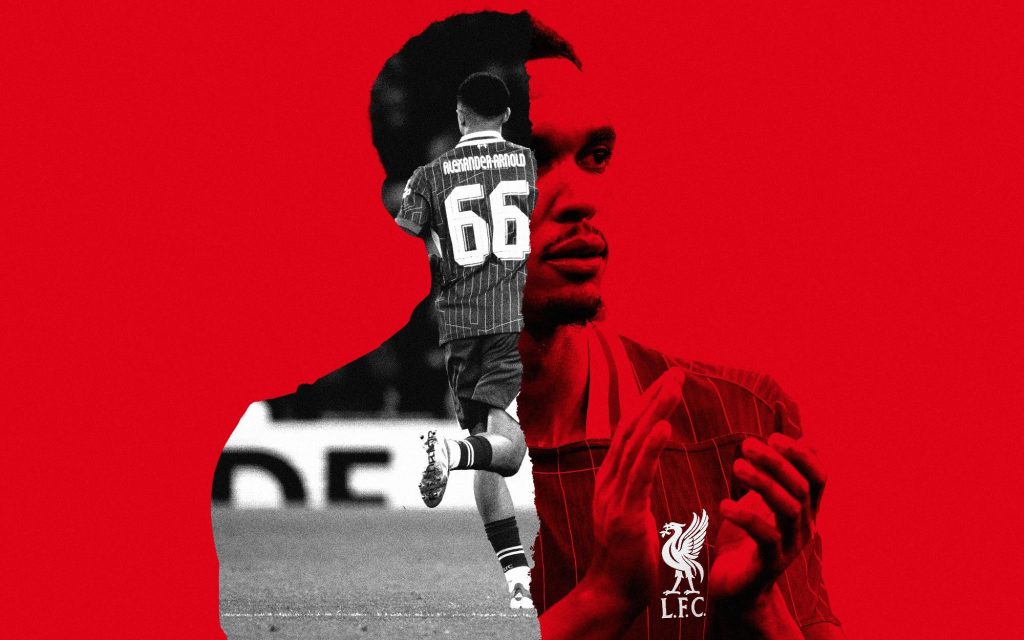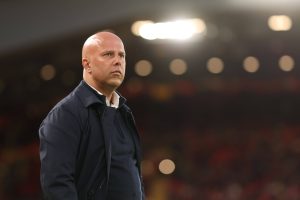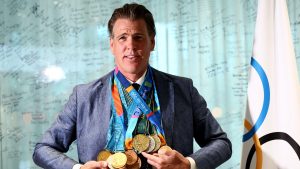
When Trent Alexander-Arnold requested a face-to-face meeting with Arne Slot during the last international break in March, Liverpool sensed they were about to hear the news they feared.
The 26-year-old had remained on Merseyside for treatment on an injured ankle, the rumours and calculated guesses had ramped up a notch following Liverpool’s Carabao Cup defeat by Newcastle United, and after weeks and months of agonising, it was decision day.
Alexander-Arnold informed Slot he would not be signing another contract. After 20 years at Liverpool and having won everything at his boyhood club, the vice-captain said he craved a fresh challenge.
Now he was driven by the prospect of conquering a new league and feeling invigorated as the marquee signing who had to prove himself at the biggest club in the world. Staying would have been the safe option, he believes.
Since then it has been a question of how and when to tell the millions of Liverpool supporters clinging to the hope he would commit for another four years.
Just like his former coach and mentor Jürgen Klopp, the media weapon of choice to break hearts was a sobering video message.

Notable by its absence so far is confirmation of where Alexander-Arnold will go. No contract has been signed with Real Madrid yet, but all roads lead to the Bernabéu.
Alexander-Arnold is under no illusions about how his announcement will be received.
There are those who have told him he should have delayed the announcement until after the Premier League trophy ceremony and the victory parade on May 26, thus avoiding being jeered in the remaining three league games or when the streets are lined with hundreds of thousands of fans.
The counter-argument, one that Alexander-Arnold heartily supports, is that waiting until the stadium and streets are empty would be a coward’s approach. Better to front it up. There will be a broad spectrum of opinion, some of it unpleasant, much of it understanding. He hopes the majority will be receptive to his reasoning. He also knows that might take time and, in some cases, is a forlorn expectation.
No heroes or villains in contract saga
When reviewing the Alexander-Arnold situation, it should be possible to accept that two opposing arguments are logical and fair.
If a footballer wants to play for Real Madrid, how crass does it sound telling him he should not?
Equally, supporters investing thousands to watch their heroes are hardly going to commission a fresh coat of paint on the mural outside the stadium when a home-grown legend chooses to join a Champions League rival. An emotional response is inevitable, especially with Liverpool primed to challenge for more Premier League and European Cups in the years ahead.
So long as the sense of disappointment does not cross the line into toxic abuse or physical threats, such passion is the lifeblood of the game.

There are no heroes or villains in this saga, so how did it come to this? Initially, it appears to have been a consequence of bad timing. Alexander-Arnold’s contract was due for renewal during a complicated period in the summer of 2023 when the club were on to their third sporting director in two years.
Klopp was considering his future, Liverpool were understandably preoccupied with rebuilding the midfield, and there may have been a misplaced assumption at the very top of the club that the boyhood Liverpudlian would re-sign when the first offer materialised, as on previous occasions.
Rightly or wrongly, Alexander-Arnold felt his situation was being parked for a later, as yet unspecified date, and it was not entirely clear who would be negotiating on the club’s behalf. At such moments a player can start to feel undervalued or taken for granted, even if that is far from the intention of those working to a different timetable. It was around the same time, in the summer of 2023, that Alexander-Arnold was named vice-captain. From the club’s perspective, that underlined how much he is valued.
Had contract talks begun then, and if Liverpool’s football executive department was as stable as right now, the indications are Alexander-Arnold would have signed another two-year extension. First-hand testimony can be provided that less than two years ago, his only thought was when the call would come to discuss terms.
Defender grew twitchy as negotiations stalled
On October 5 last season, Alexander-Arnold was asked to perform media duties before the Europa League tie with Union Saint-Gilloise. By then, he was increasingly twitchy there was no progress on contract talks.
Away from the cameras, he was asked directly that day if Jude Bellingham’s amazing start at Real might tempt him to follow his England team-mate to Spain. With no hesitation, he said his mind was focused only on staying at Liverpool.
What changed? Pretty much everything at the club. Talks remained on hold and a month later Klopp was informing the owners he was leaving at the end of the season. The players were told in January 2024.
They were wondering what would happen next. The club’s primary focus was on rebuilding the structure by bringing back Michael Edwards as football chief executive and hiring sporting director Richard Hughes, who were then entrusted with finding and appointing Klopp’s successor. New deals for players were not top of the agenda.
For those with just over a year left – Alexander-Arnold, Mohamed Salah and Virgil van Dijk – the dynamic had shifted.
Once Edwards and Hughes were in office, they were picking up three hand grenades with the contract situation. They know the situation should never have advanced to such a precarious stage.
Shortly after being confirmed in post, Hughes sought urgent talks with Alexander-Arnold, the first formal contract offer made in April 2024.
By the summer of 2024, other options were materialising for Alexander-Arnold as the noise from Madrid intensified. He was minded to bide his time and give serious thought to the only offer that could tempt him to leave Anfield.
Leaving on a free rankles with fans
Liverpool’s start under new manager Slot was reassuring, but for the first time in his career, Alexander-Arnold’s mind was drifting towards other possibilities.
What would it be like to feel the same buzz as Van Dijk when he left Southampton for Liverpool, Salah and Alisson when arriving from Roma, Alexis Mac Allister after making the tough decision to leave Brighton for Anfield, and Slot when he quit Feyenoord to replace Klopp?
It is an experience denied the ‘one-club men’ of old, and one Alexander-Arnold did not want to look back upon and miss; the chance to leave home for a new country, impress a different fanbase excited by a new arrival, and adapt to a new culture, against different opponents in new arenas.
At one point he thought it might happen sooner. He was on holiday in Venice on New Year’s Eve when news of Real’s £20 million bid went public. He was intrigued as to how Liverpool would respond. Accepting the offer might have appeased those who are particularly upset he will leave for nothing.
Liverpool’s instant rejection may have been intended to send a message to Alexander-Arnold that the club were desperate to keep him and would not close the door no matter how close to the end of his deal he was. That was also the case with Salah and Van Dijk, the duo eventually signing two months before their contracts expired.
Equally, it may have been a means of informing the fanbase that negotiations must have been ongoing between the player and Real behind the scenes. Such offers do not materialise unless the Spanish giants are sure the subject of their interest wants to join. From then on, there was no longer any ambiguity about the direction of travel.
The immediate consequences were not positive, as some Liverpool supporters reacted as negatively to Alexander-Arnold as they did when Steve McManaman made the same Bosman move at the end of 1998-99 season. The fact he would be leaving for free rankled, the argument that he did not cost Liverpool a penny in a transfer fee of no consequence.
The lowest point was during January’s 2-2 draw against Manchester United in Alexander-Arnold’s first game since news of Real’s bid was known, his mind such a blur in a poor performance that he has since confided to friends he remembers nothing about being on the Anfield pitch that day. It meant a lot to Alexander-Arnold that one of the first to get and touch and make sure he was OK was sporting director Hughes.
Lisandro Martínez unleashes a thunderbolt strike beyond Alisson! 🔥 pic.twitter.com/z3vmqkbIol
— Sky Sports Premier League (@SkySportsPL) January 5, 2025
Determined to prove his commitment, he made swift recoveries from hamstring, quad and ankle injuries to help drive the title bid.
There were some eye-catching celebrations, too, cupping his ear to fans after scoring at West Ham United. That was a source of regret later as it was directed at the few who were questioning his love for the club.
More memorable was removing his jersey after scoring the winner at Leicester City to set up the Anfield title-clincher last weekend.
That was the Liverpool fan in Alexander-Arnold making a final gesture rather than signal an about-turn was coming.
— . (@story98394) December 29, 2024
The reaction of his team-mates and manager is informative of how the decision has been received internally.
Given they knew Alexander-Arnold’s decision at the time, Van Dijk’s pushing him forward to accept acclaim and Slot’s comments about his defender’s contribution to another title-winning season reflect the broader attitude of those who have worked with him. “It would be ridiculous if someone argues his commitment for this club,” said Slot.
Those views are likely to be echoed by those who, while deflated to see him go, are appreciative of his overall, legendary contribution.

Within Anfield there is more mutual respect rather than recrimination. The Kop’s reaction when Alexander-Arnold lines up against Arsenal on Sunday will offer the first clues as to whether that will be the case in the stands.
There will be many who cannot accept his decision, and one is reminded the reaction from a Liverpool owner on the day Philippe Coutinho begged to be sold to Barcelona in 2018 to live his dream. “And what about our dreams and those of the supporters, your manager and team-mates? Do they not matter?”
The critical difference in this case is that Alexander-Arnold departs with the winner’s medal around his neck, just like Kevin Keegan when he moved to Hamburg in 1977 and Graeme Souness to Sampdoria in 1984. Like them, or Ian Rush when he joined Juventus in 1987, Alexander-Arnold is flying out of the promised land, not undermining his club’s chances of reaching it.
Ever since his move to Spain became likely, one has been reminded of the scene between Obi-Wan Kenobi and Anakin Skywalker at the climax of the Star Wars prequels.
“You were the chosen one,” the Liverpool supporters yell at their contract rebel. “It was said you would destroy Real Madrid, not join them.”

Alexander-Arnold broke into the Liverpool team as a fresh-faced youth recalling climbing Melwood’s walls to glimpse his heroes, his lifetime ambition to become permanent captain.
The script was pre-written for him to be the next Steven Gerrard, although if the criticism ramps up, he might issue a pertinent reminder of how that story ended – aged 34 and granted a 15-minute meeting in the chief executive’s office to be told: “Thanks for everything, but we can’t guarantee you’ll play much here next season. Best of luck in Major League Soccer.”
Alexander-Arnold will be the latest to learn that, so long as club legends leave on the club’s terms, there are garlands and guards of honour. Leave on your own at your peril. It’s the blessing and curse of being a genius footballer.
Whatever the response, Alexander-Arnold intends to be back at Anfield next season and beyond his playing days. When his schedule allows, he will sit in the Main Stand, where he has an executive box, cheering on his former team-mates and the next generation of stars.
He knows the heckles will continue. “I’d never have left Anfield to join them,” was the familiar accusation directed at Michael Owen and McManaman. Like his predecessors, and unpalatable as it is the Kop, Alexander-Arnold may be consoled by the most pertinent response.
“Only the very best players of their generation get a chance to.”

When Trent Alexander-Arnold requested a face-to-face meeting with Arne Slot during the last international break in March, Liverpool sensed they were about to hear the news they feared.
The 26-year-old had remained on Merseyside for treatment on an injured ankle, the rumours and calculated guesses had ramped up a notch following Liverpool’s Carabao Cup defeat by Newcastle United, and after weeks and months of agonising, it was decision day.
Alexander-Arnold informed Slot he would not be signing another contract. After 20 years at Liverpool and having won everything at his boyhood club, the vice-captain said he craved a fresh challenge.
Now he was driven by the prospect of conquering a new league and feeling invigorated as the marquee signing who had to prove himself at the biggest club in the world. Staying would have been the safe option, he believes.
Since then it has been a question of how and when to tell the millions of Liverpool supporters clinging to the hope he would commit for another four years.
Just like his former coach and mentor Jürgen Klopp, the media weapon of choice to break hearts was a sobering video message.

Notable by its absence so far is confirmation of where Alexander-Arnold will go. No contract has been signed with Real Madrid yet, but all roads lead to the Bernabéu.
Alexander-Arnold is under no illusions about how his announcement will be received.
There are those who have told him he should have delayed the announcement until after the Premier League trophy ceremony and the victory parade on May 26, thus avoiding being jeered in the remaining three league games or when the streets are lined with hundreds of thousands of fans.
The counter-argument, one that Alexander-Arnold heartily supports, is that waiting until the stadium and streets are empty would be a coward’s approach. Better to front it up. There will be a broad spectrum of opinion, some of it unpleasant, much of it understanding. He hopes the majority will be receptive to his reasoning. He also knows that might take time and, in some cases, is a forlorn expectation.
No heroes or villains in contract saga
When reviewing the Alexander-Arnold situation, it should be possible to accept that two opposing arguments are logical and fair.
If a footballer wants to play for Real Madrid, how crass does it sound telling him he should not?
Equally, supporters investing thousands to watch their heroes are hardly going to commission a fresh coat of paint on the mural outside the stadium when a home-grown legend chooses to join a Champions League rival. An emotional response is inevitable, especially with Liverpool primed to challenge for more Premier League and European Cups in the years ahead.
So long as the sense of disappointment does not cross the line into toxic abuse or physical threats, such passion is the lifeblood of the game.

There are no heroes or villains in this saga, so how did it come to this? Initially, it appears to have been a consequence of bad timing. Alexander-Arnold’s contract was due for renewal during a complicated period in the summer of 2023 when the club were on to their third sporting director in two years.
Klopp was considering his future, Liverpool were understandably preoccupied with rebuilding the midfield, and there may have been a misplaced assumption at the very top of the club that the boyhood Liverpudlian would re-sign when the first offer materialised, as on previous occasions.
Rightly or wrongly, Alexander-Arnold felt his situation was being parked for a later, as yet unspecified date, and it was not entirely clear who would be negotiating on the club’s behalf. At such moments a player can start to feel undervalued or taken for granted, even if that is far from the intention of those working to a different timetable. It was around the same time, in the summer of 2023, that Alexander-Arnold was named vice-captain. From the club’s perspective, that underlined how much he is valued.
Had contract talks begun then, and if Liverpool’s football executive department was as stable as right now, the indications are Alexander-Arnold would have signed another two-year extension. First-hand testimony can be provided that less than two years ago, his only thought was when the call would come to discuss terms.
Defender grew twitchy as negotiations stalled
On October 5 last season, Alexander-Arnold was asked to perform media duties before the Europa League tie with Union Saint-Gilloise. By then, he was increasingly twitchy there was no progress on contract talks.
Away from the cameras, he was asked directly that day if Jude Bellingham’s amazing start at Real might tempt him to follow his England team-mate to Spain. With no hesitation, he said his mind was focused only on staying at Liverpool.
What changed? Pretty much everything at the club. Talks remained on hold and a month later Klopp was informing the owners he was leaving at the end of the season. The players were told in January 2024.
They were wondering what would happen next. The club’s primary focus was on rebuilding the structure by bringing back Michael Edwards as football chief executive and hiring sporting director Richard Hughes, who were then entrusted with finding and appointing Klopp’s successor. New deals for players were not top of the agenda.
For those with just over a year left – Alexander-Arnold, Mohamed Salah and Virgil van Dijk – the dynamic had shifted.
Once Edwards and Hughes were in office, they were picking up three hand grenades with the contract situation. They know the situation should never have advanced to such a precarious stage.
Shortly after being confirmed in post, Hughes sought urgent talks with Alexander-Arnold, the first formal contract offer made in April 2024.
By the summer of 2024, other options were materialising for Alexander-Arnold as the noise from Madrid intensified. He was minded to bide his time and give serious thought to the only offer that could tempt him to leave Anfield.
Leaving on a free rankles with fans
Liverpool’s start under new manager Slot was reassuring, but for the first time in his career, Alexander-Arnold’s mind was drifting towards other possibilities.
What would it be like to feel the same buzz as Van Dijk when he left Southampton for Liverpool, Salah and Alisson when arriving from Roma, Alexis Mac Allister after making the tough decision to leave Brighton for Anfield, and Slot when he quit Feyenoord to replace Klopp?
It is an experience denied the ‘one-club men’ of old, and one Alexander-Arnold did not want to look back upon and miss; the chance to leave home for a new country, impress a different fanbase excited by a new arrival, and adapt to a new culture, against different opponents in new arenas.
At one point he thought it might happen sooner. He was on holiday in Venice on New Year’s Eve when news of Real’s £20 million bid went public. He was intrigued as to how Liverpool would respond. Accepting the offer might have appeased those who are particularly upset he will leave for nothing.
Liverpool’s instant rejection may have been intended to send a message to Alexander-Arnold that the club were desperate to keep him and would not close the door no matter how close to the end of his deal he was. That was also the case with Salah and Van Dijk, the duo eventually signing two months before their contracts expired.
Equally, it may have been a means of informing the fanbase that negotiations must have been ongoing between the player and Real behind the scenes. Such offers do not materialise unless the Spanish giants are sure the subject of their interest wants to join. From then on, there was no longer any ambiguity about the direction of travel.
The immediate consequences were not positive, as some Liverpool supporters reacted as negatively to Alexander-Arnold as they did when Steve McManaman made the same Bosman move at the end of 1998-99 season. The fact he would be leaving for free rankled, the argument that he did not cost Liverpool a penny in a transfer fee of no consequence.
The lowest point was during January’s 2-2 draw against Manchester United in Alexander-Arnold’s first game since news of Real’s bid was known, his mind such a blur in a poor performance that he has since confided to friends he remembers nothing about being on the Anfield pitch that day. It meant a lot to Alexander-Arnold that one of the first to get and touch and make sure he was OK was sporting director Hughes.
Lisandro Martínez unleashes a thunderbolt strike beyond Alisson! 🔥 pic.twitter.com/z3vmqkbIol
— Sky Sports Premier League (@SkySportsPL) January 5, 2025
Determined to prove his commitment, he made swift recoveries from hamstring, quad and ankle injuries to help drive the title bid.
There were some eye-catching celebrations, too, cupping his ear to fans after scoring at West Ham United. That was a source of regret later as it was directed at the few who were questioning his love for the club.
More memorable was removing his jersey after scoring the winner at Leicester City to set up the Anfield title-clincher last weekend.
That was the Liverpool fan in Alexander-Arnold making a final gesture rather than signal an about-turn was coming.
— . (@story98394) December 29, 2024
The reaction of his team-mates and manager is informative of how the decision has been received internally.
Given they knew Alexander-Arnold’s decision at the time, Van Dijk’s pushing him forward to accept acclaim and Slot’s comments about his defender’s contribution to another title-winning season reflect the broader attitude of those who have worked with him. “It would be ridiculous if someone argues his commitment for this club,” said Slot.
Those views are likely to be echoed by those who, while deflated to see him go, are appreciative of his overall, legendary contribution.

Within Anfield there is more mutual respect rather than recrimination. The Kop’s reaction when Alexander-Arnold lines up against Arsenal on Sunday will offer the first clues as to whether that will be the case in the stands.
There will be many who cannot accept his decision, and one is reminded the reaction from a Liverpool owner on the day Philippe Coutinho begged to be sold to Barcelona in 2018 to live his dream. “And what about our dreams and those of the supporters, your manager and team-mates? Do they not matter?”
The critical difference in this case is that Alexander-Arnold departs with the winner’s medal around his neck, just like Kevin Keegan when he moved to Hamburg in 1977 and Graeme Souness to Sampdoria in 1984. Like them, or Ian Rush when he joined Juventus in 1987, Alexander-Arnold is flying out of the promised land, not undermining his club’s chances of reaching it.
Ever since his move to Spain became likely, one has been reminded of the scene between Obi-Wan Kenobi and Anakin Skywalker at the climax of the Star Wars prequels.
“You were the chosen one,” the Liverpool supporters yell at their contract rebel. “It was said you would destroy Real Madrid, not join them.”

Alexander-Arnold broke into the Liverpool team as a fresh-faced youth recalling climbing Melwood’s walls to glimpse his heroes, his lifetime ambition to become permanent captain.
The script was pre-written for him to be the next Steven Gerrard, although if the criticism ramps up, he might issue a pertinent reminder of how that story ended – aged 34 and granted a 15-minute meeting in the chief executive’s office to be told: “Thanks for everything, but we can’t guarantee you’ll play much here next season. Best of luck in Major League Soccer.”
Alexander-Arnold will be the latest to learn that, so long as club legends leave on the club’s terms, there are garlands and guards of honour. Leave on your own at your peril. It’s the blessing and curse of being a genius footballer.
Whatever the response, Alexander-Arnold intends to be back at Anfield next season and beyond his playing days. When his schedule allows, he will sit in the Main Stand, where he has an executive box, cheering on his former team-mates and the next generation of stars.
He knows the heckles will continue. “I’d never have left Anfield to join them,” was the familiar accusation directed at Michael Owen and McManaman. Like his predecessors, and unpalatable as it is the Kop, Alexander-Arnold may be consoled by the most pertinent response.
“Only the very best players of their generation get a chance to.”











